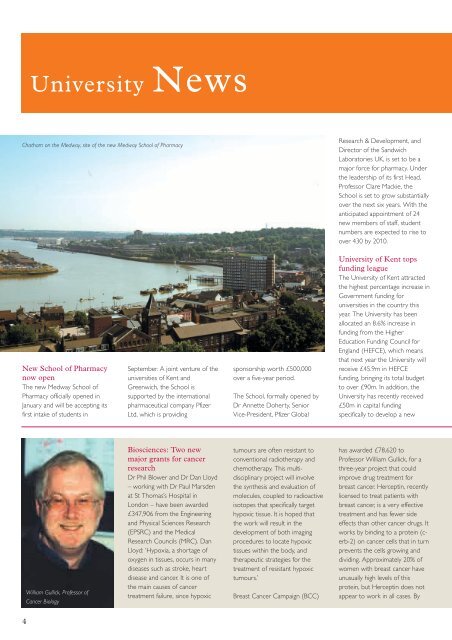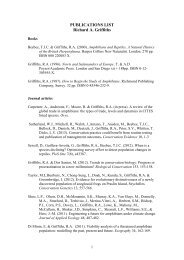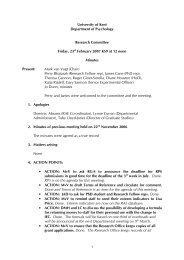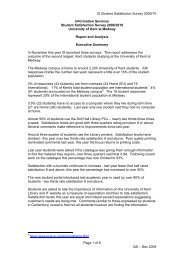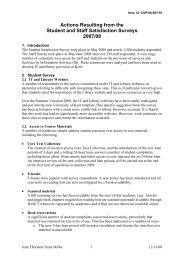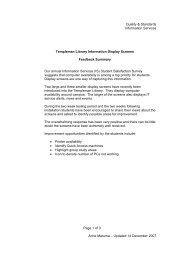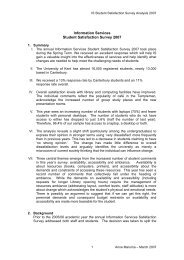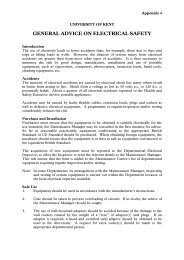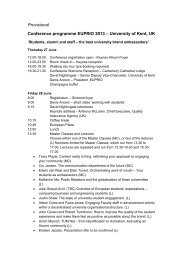Spring 2004 - University of Kent
Spring 2004 - University of Kent
Spring 2004 - University of Kent
You also want an ePaper? Increase the reach of your titles
YUMPU automatically turns print PDFs into web optimized ePapers that Google loves.
<strong>University</strong> News<br />
Chatham on the Medway, site <strong>of</strong> the new Medway School <strong>of</strong> Pharmacy<br />
Research & Development, and<br />
Director <strong>of</strong> the Sandwich<br />
Laboratories UK, is set to be a<br />
major force for pharmacy. Under<br />
the leadership <strong>of</strong> its first Head,<br />
Pr<strong>of</strong>essor Clare Mackie, the<br />
School is set to grow substantially<br />
over the next six years. With the<br />
anticipated appointment <strong>of</strong> 24<br />
new members <strong>of</strong> staff, student<br />
numbers are expected to rise to<br />
over 430 by 2010.<br />
New School <strong>of</strong> Pharmacy<br />
now open<br />
The new Medway School <strong>of</strong><br />
Pharmacy <strong>of</strong>ficially opened in<br />
January and will be accepting its<br />
first intake <strong>of</strong> students in<br />
September. A joint venture <strong>of</strong> the<br />
universities <strong>of</strong> <strong>Kent</strong> and<br />
Greenwich, the School is<br />
supported by the international<br />
pharmaceutical company Pfizer<br />
Ltd, which is providing<br />
sponsorship worth £500,000<br />
over a five-year period.<br />
The School, formally opened by<br />
Dr Annette Doherty, Senior<br />
Vice-President, Pfizer Global<br />
<strong>University</strong> <strong>of</strong> <strong>Kent</strong> tops<br />
funding league<br />
The <strong>University</strong> <strong>of</strong> <strong>Kent</strong> attracted<br />
the highest percentage increase in<br />
Government funding for<br />
universities in the country this<br />
year. The <strong>University</strong> has been<br />
allocated an 8.6% increase in<br />
funding from the Higher<br />
Education Funding Council for<br />
England (HEFCE), which means<br />
that next year the <strong>University</strong> will<br />
receive £45.9m in HEFCE<br />
funding, bringing its total budget<br />
to over £90m. In addition, the<br />
<strong>University</strong> has recently received<br />
£50m in capital funding<br />
specifically to develop a new<br />
William Gullick, Pr<strong>of</strong>essor <strong>of</strong><br />
Cancer Biology<br />
Biosciences: Two new<br />
major grants for cancer<br />
research<br />
Dr Phil Blower and Dr Dan Lloyd<br />
– working with Dr Paul Marsden<br />
at St Thomas’s Hospital in<br />
London – have been awarded<br />
£347,906 from the Engineering<br />
and Physical Sciences Research<br />
(EPSRC) and the Medical<br />
Research Councils (MRC). Dan<br />
Lloyd: ‘Hypoxia, a shortage <strong>of</strong><br />
oxygen in tissues, occurs in many<br />
diseases such as stroke, heart<br />
disease and cancer. It is one <strong>of</strong><br />
the main causes <strong>of</strong> cancer<br />
treatment failure, since hypoxic<br />
tumours are <strong>of</strong>ten resistant to<br />
conventional radiotherapy and<br />
chemotherapy. This multidisciplinary<br />
project will involve<br />
the synthesis and evaluation <strong>of</strong><br />
molecules, coupled to radioactive<br />
isotopes that specifically target<br />
hypoxic tissue. It is hoped that<br />
the work will result in the<br />
development <strong>of</strong> both imaging<br />
procedures to locate hypoxic<br />
tissues within the body, and<br />
therapeutic strategies for the<br />
treatment <strong>of</strong> resistant hypoxic<br />
tumours.’<br />
Breast Cancer Campaign (BCC)<br />
has awarded £78,620 to<br />
Pr<strong>of</strong>essor William Gullick, for a<br />
three-year project that could<br />
improve drug treatment for<br />
breast cancer. Herceptin, recently<br />
licensed to treat patients with<br />
breast cancer, is a very effective<br />
treatment and has fewer side<br />
effects than other cancer drugs. It<br />
works by binding to a protein (cerb-2)<br />
on cancer cells that in turn<br />
prevents the cells growing and<br />
dividing. Approximately 20% <strong>of</strong><br />
women with breast cancer have<br />
unusually high levels <strong>of</strong> this<br />
protein, but Herceptin does not<br />
appear to work in all cases. By<br />
4


